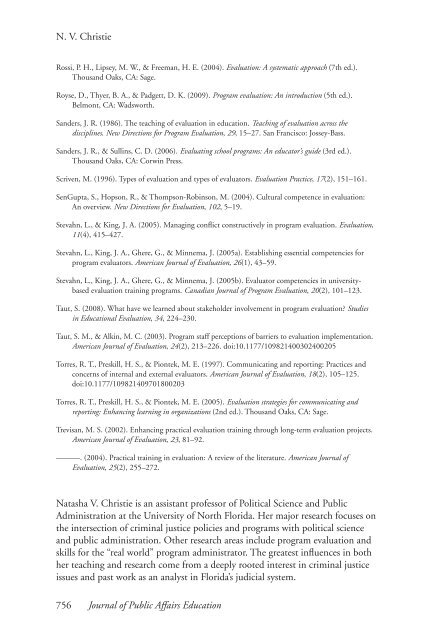An Interpersonal Skills Learning Taxonomy for Program Evaluation ...
An Interpersonal Skills Learning Taxonomy for Program Evaluation ...
An Interpersonal Skills Learning Taxonomy for Program Evaluation ...
Create successful ePaper yourself
Turn your PDF publications into a flip-book with our unique Google optimized e-Paper software.
N. V. ChristieRossi, P. H., Lipsey, M. W., & Freeman, H. E. (2004). <strong>Evaluation</strong>: A systematic approach (7th ed.).Thousand Oaks, CA: Sage.Royse, D., Thyer, B. A., & Padgett, D. K. (2009). <strong>Program</strong> evaluation: <strong>An</strong> introduction (5th ed.).Belmont, CA: Wadsworth.Sanders, J. R. (1986). The teaching of evaluation in education. Teaching of evaluation across thedisciplines. New Directions <strong>for</strong> <strong>Program</strong> <strong>Evaluation</strong>, 29, 15–27. San Francisco: Jossey-Bass.Sanders, J. R., & Sullins, C. D. (2006). Evaluating school programs: <strong>An</strong> educator’s guide (3rd ed.).Thousand Oaks, CA: Corwin Press.Scriven, M. (1996). Types of evaluation and types of evaluators. <strong>Evaluation</strong> Practice, 17(2), 151–161.SenGupta, S., Hopson, R., & Thompson-Robinson, M. (2004). Cultural competence in evaluation:<strong>An</strong> overview. New Directions <strong>for</strong> <strong>Evaluation</strong>, 102, 5–19.Stevahn, L., & King, J. A. (2005). Managing conflict constructively in program evaluation. <strong>Evaluation</strong>,11(4), 415–427.Stevahn, L., King, J. A., Ghere, G., & Minnema, J. (2005a). Establishing essential competencies <strong>for</strong>program evaluators. American Journal of <strong>Evaluation</strong>, 26(1), 43–59.Stevahn, L., King, J. A., Ghere, G., & Minnema, J. (2005b). Evaluator competencies in universitybasedevaluation training programs. Canadian Journal of <strong>Program</strong> <strong>Evaluation</strong>, 20(2), 101–123.Taut, S. (2008). What have we learned about stakeholder involvement in program evaluation? Studiesin Educational <strong>Evaluation</strong>, 34, 224–230.Taut, S. M., & Alkin, M. C. (2003). <strong>Program</strong> staff perceptions of barriers to evaluation implementation.American Journal of <strong>Evaluation</strong>, 24(2), 213–226. doi:10.1177/109821400302400205Torres, R. T., Preskill, H. S., & Piontek, M. E. (1997). Communicating and reporting: Practices andconcerns of internal and external evaluators. American Journal of <strong>Evaluation</strong>, 18(2), 105–125.doi:10.1177/109821409701800203Torres, R. T., Preskill, H. S., & Piontek, M. E. (2005). <strong>Evaluation</strong> strategies <strong>for</strong> communicating andreporting: Enhancing learning in organizations (2nd ed.). Thousand Oaks, CA: Sage.Trevisan, M. S. (2002). Enhancing practical evaluation training through long-term evaluation projects.American Journal of <strong>Evaluation</strong>, 23, 81–92.———. (2004). Practical training in evaluation: A review of the literature. American Journal of<strong>Evaluation</strong>, 25(2), 255–272.Natasha V. Christie is an assistant professor of Political Science and PublicAdministration at the University of North Florida. Her major research focuses onthe intersection of criminal justice policies and programs with political scienceand public administration. Other research areas include program evaluation andskills <strong>for</strong> the “real world” program administrator. The greatest influences in bothher teaching and research come from a deeply rooted interest in criminal justiceissues and past work as an analyst in Florida’s judicial system.756 Journal of Public Affairs Education
















